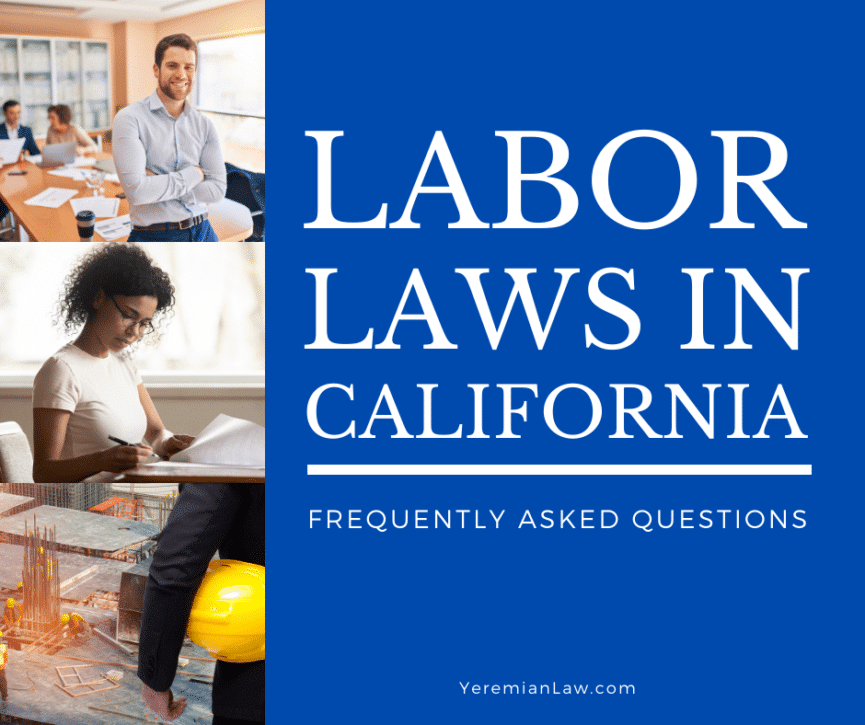Labor laws in California are generally more protective of workers than federal laws are – but what are your rights as an employee in California? How many days can you work in a row without a day off? Can you be fired without reason? This guide explains labor laws in California designed to protect workers and ensure that the state’s economy stays strong. If you don’t see the answer to your question here, we’re always available to help – just call us at 818-230-8380 to tell us about your situation, and if we can help you, we will.

Labor Laws in California: Frequently Asked Questions
Some of the most common questions we hear from clients involve what employers are allowed to “get away with.” And while it’s true that some employers try to skirt the law, save money at their employees’ expense, and don’t provide adequate protections, there are many employers that take good care of their workforces. However, these are some of the most frequently asked questions we get on labor laws in California.
Related: California employment law basics
What Are My Rights as an Employee in California?
Employees have several rights in California. While the laws continuously evolve, in many cases providing more worker protections, your basic rights as an employee in California include:
- The right to a fair wage for your labor
- The right to fair work breaks
- The right to a safe workplace that’s free from dangerous conditions that could injure you or make you sick
- The right to a harassment-free workplace
- The right to a discrimination-free workplace
- The right to be free from workplace retaliation
How Many Days Straight Can You Work in California?
You can work up to 12 days in a row in California without a day off. Here’s how it breaks down: California employees are entitled to one day of rest in one workweek. The workweek can start on any day of the week. If your workweek runs from Monday to Sunday, for example, your rest day could be Monday the first week and Sunday the following week. Check out this table for an illustration.
| Monday | Tuesday | Wednesday | Thursday | Friday | Saturday | Sunday | |
| Week 1 | Rest day | Work | Work | Work | Work | Work | Work |
| Week 2 | Work | Work | Work | Work | Work | Work | Rest day |
In this example, the employee gets one rest day per workweek – but the rest days don’t have to be the same each week. If you work for two different employers, each employer has its own workweek – neither has to go by what your other employer does. For example, your days off may be Sunday and Monday with your first employer and Wednesday and Thursday with your other employer. You’re still technically working every day without a day off, but each employer has its own workweek and its own days off. Your second employer doesn’t have to match days off with your first employer.

Can You Be Fired Without Reason in California?
You can be fired without reason in California. California is an at-will employment state, which means your employer can terminate you for any lawful reason. (You can’t be fired for any discriminatory reason, though.) That means your employer can use any reason to fire you – to include disliking your personality or the way you perform your job.
If your employer fires you for an illegal reason, such as discrimination or because you made a complaint, you may have a wrongful termination claim.
Related: Do I have a wrongful termination claim?
Does California Have Overtime After 8 Hours or 40 Hours?
In California, hourly nonexempt workers are entitled to overtime pay. Employers are required by law to pay it. If you work 8 or more hours in one day, you’re entitled to time and a half, which is 1.5 times your regular rate of pay, for each hour you work over eight. If you work more than 40 hours in one workweek, you’re entitled to time and a half for each hour you work over 40. There’s more, though. If you work 12 or more hours in one day, you’re entitled to two times your regular rate for each hour over that amount, and if you work more than 8 hours on the 7th consecutive day in one workweek, you’re also entitled to double your regular rate of pay. This table illustrates.
|
Hours Worked |
Rate of Pay |
| 8 or more in one day | 1.5 times your regular rate |
| 40 or more in one workweek | 1.5 times your regular rate |
| 7th consecutive day in one workweek | 1.5 times your regular rate |
| 12 or more in one day | 2 times your regular rate |
| More than 8 hours on the 7th consecutive day in one workweek | 2 times your regular rate |
Can My Employer Change My Schedule Last-Minute in California?
Under the Fair Labor Standards Act, most employers are allowed to change an employee’s schedule without prior notice – but some cities have adopted stricter regulations that require employers to make scheduling changes far in advance of workdays. There is no statewide law that regulates when employers can change your schedule. If you’re covered under a collective bargaining agreement, or if you have an employment contract from your employer that says it cannot change your schedule without notice, it’s another story.

What Constitutes Wrongful Termination in California?
California is an at-will employment state, which means your employer can fire you for any reason except an illegal one. If you’re fired for an illegal reason, your company fires you in violation of its own company policy, or if you’re fired for a reason not covered in your employment contract, you could have grounds to file a wrongful termination lawsuit. Some examples of wrongful termination include:
- Discrimination
- Retaliation
- Refusal to commit an illegal act
- Protected absences (such as FMLA leave or military service)
- Sexual harassment
Related: Do I have a wrongful termination claim in Los Angeles?
Can My Employer Change My Schedule Without Notice in California?
In most places in California, employers can change an employee’s work schedule without notice. That doesn’t make it right, but there isn’t a law in place that requires employers to make scheduling changes within a certain period of time. There are some cities, however, that have enacted predictive scheduling laws that require employers to provide specific amounts of notice before changing an employee’s schedule.
What Qualifies as Wrongful Termination?
Wrongful termination occurs when your employer fires you for an illegal reason or violates its own company policy to fire you. Some illegal reasons to fire an employee include those related to:
- Discrimination
- Whistleblowing and retaliation
- An employee’s refusal to commit an illegal act
- An employee’s protected absences (like those authorized by the Family Medical Leave Act or military service)

Who is an Employer Under California Law?
Under California law, an employer is any person (as defined in Section 18 of the Labor Code) who directly or indirectly, or through an agent or any other person, employs or exercises control over the wages, hours or working conditions of any person. In Section 18 of the California Labor Code, a “person” is any actual person, association, organization, partnership, business trust, limited liability company or corporation.
How Do You File a Complaint Against Your Employer?
When you have an issue with your employer, most employment attorneys will tell you to contact your company’s HR department to see if you can resolve it. When that doesn’t work, you have the right to file a complaint with the California Labor Commission or the Labor Enforcement Task Force, which you can use to report a widespread violation of labor law. You also have the right to call a Los Angeles employment attorney to find out how to file a complaint against your employer.
What Are the Employees’ Rights?
Every employee in the country has the right to:
- Work in a place that’s free from harassment or discrimination
- Receive equal pay for equal work
- Receive reasonable accommodations for medical conditions or religious beliefs
- Report violations of the law without being retaliated against
- Expect medical information or genetic information given to an employer to be kept confidential

How Long Does an Employer Have to Correct a Paycheck in California?
The Fair Labor Standards Act, or FLSA, doesn’t specify when an employer has to correct an error in a paycheck. However, when an employer makes a mistake, it has violated the law – and it’s supposed to make a correction as soon as possible to show that the company wasn’t willfully trying to violate the law. Employees have a right to immediately file a claim with the California Labor Commission if an employer underpays.
When it comes to a final paycheck, though, the employer should correct the underpayment immediately. If the employer makes you wait, it could face waiting time penalties – and those equal one full day’s wages up to a maximum of 30 days.
Do You Need to Talk to an Employment Lawyer About Labor Laws in California?
If you still have questions, or if you think you may have a case against your employer, please call us at 818-230-8380 right away. We’ll talk about your situation and help you determine what to do next – and if there’s a legal option to resolve your issues, we’ll help you take it.




